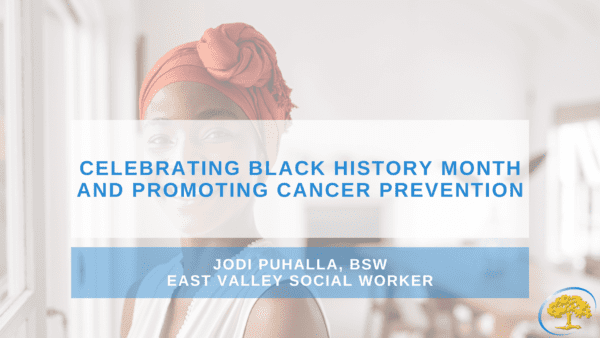
Posted 1 year ago
Celebrating Black History Month and Promoting Cancer Prevention
Coming on the heels of New Year’s resolutions, winter is the perfect time for us all to prioritize our health and that of loved ones. February is not only Black History Month but National Cancer Prevention Month. Learning about the systemic health inequities and disproportionate medical risk factors which Black populations face is key for improving current and future health outcomes for this community.
Recent data from the American Cancer society shows:
– Black men are at twice the risk of developing prostate cancer compared with all other racial and ethnic groups. In fact, Black men have the highest prostate cancer death rate of any racial or ethnic group in the US.
ACS researchers note that this disparity likely reflects less access to high-quality treatment, in addition to higher incidence. Studies show Black men diagnosed with advanced-stage prostate cancer are significantly less likely to receive any treatment compared with White men, even when they have similar health insurance.
– Black women are 41% more likely to die of breast cancer than White women, and the risk increases significantly in age groups over 50.
The reasons cited are:
– Higher prevalence of obesity and other health problems
– Higher incidence of triple-negative breast cancer, which is aggressive and challenging to treat. They’re also 30% more likely to die from these tumors because of lower rates of surgery and chemotherapy.
– Higher incidence of inflammatory breast cancer, an aggressive but uncommon type of breast cancer.
For decades, lung cancer has been the leading cause of death from cancer for both Black and White men and women. But as of 2019, breast cancer became the leading cause of cancer death for Black women.
This shift is attributed to the steep declines in the number of lung cancer deaths in recent years due to reductions in smoking, earlier diagnosis, and advances in treatment. Although the breast cancer death rate is also falling steadily (by a little more than 1% per year since 1995), the number of breast cancer deaths continues to rise because of the aging and growth of the population.
Other sobering statistics:
– Black women are twice as likely to die from uterine cancer as White women.
– Multiple myeloma incidence rates and death rates are about 2 times higher in Black people than in White people. Incidence rates for people younger than age 50 are almost 3 times higher for Black men and more than 3 times higher in Black women.
– Colorectal cancer death rates are 44% higher in Black men and 31% higher in Black women compared to Whites.
These disparities are complex but are likely rooted in structural racism, which contributes to inequalities in the social determinants of health, including access to care. Socioeconomic differences are linked with having more risk factors for cancer and other diseases and less access to high-quality and timely cancer prevention, early detection, and treatment and inadequate health insurance.
Because of such issues and barriers, Black people are:
– More likely to be diagnosed with advanced-stage disease, which is usually more costly and difficult to treat
– More likely to experience delays in treatment
– Less likely to receive recommended treatment
ACS researchers note that only a small fraction of the racial differences in cancer deaths can be attributed to genetic differences.
In addition to facing more systemic barriers to healthcare than their White counterparts, Black individuals receive recommended cancer screenings at a far lower rate. Black cancer patients have the shortest survival rate and highest death rate of any racial group. Because of this, being aware of family medical history, getting screenings, and reducing lifestyle risks is essential.
Awareness is always the first step to making a change. Familiarize yourself with ways to prevent cancer by going to www.cancer.org or www.ironwoodcrc.com . Great sites for learning about multiple myeloma and prostate cancer in the Black community are::https://www.talkthattalkpc.com/ and https://www.thatsmywordmm.com/
Jodi Puhalla, BSW
Social Worker for East Valley Offices
Jodi Puhalla obtained her social work degree from MN State University/Moorhead in 1990. She has spent most of her career as a medical social worker in hospitals, long term care facilities and hospice care.
Jodi is a native of Minnesota and moved to the Phoenix area in 2020. She has a passion for holistic healing and meditation. She likes to explore ancient practices for stress management in the modern world. She enjoys supporting others through difficult transitions in their lives.

